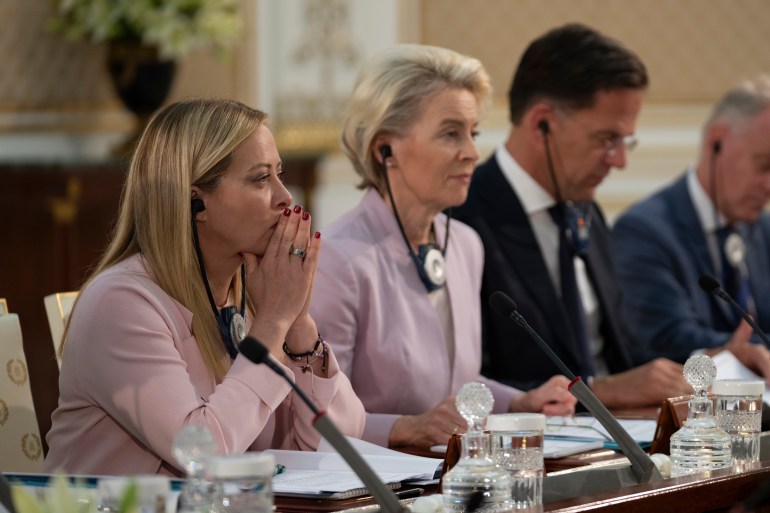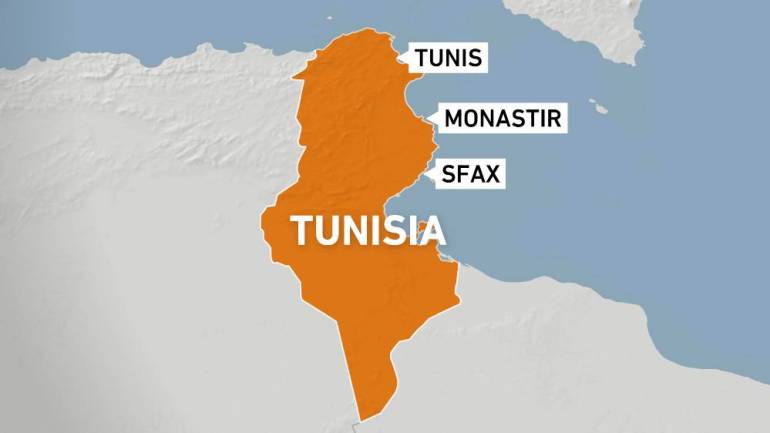Why is the EU offering Tunisia a financial assistance package?
European Commission President Ursula von der Leyen says the European Union may loan Tunisia more than 1 billion euros ($1.07 billion) with the lion’s share positioned as “macro-financial assistance” designed to save Tunisia’s faltering economy.
The potential package, which was announced on Sunday during von der Leyen’s visit to Tunisia with Italian and Dutch Prime Ministers Giorgia Meloni and Mark Rutte, is part of a larger effort by the EU to stem the flow of refugees mainly from sub-Saharan African countries trying to reach the Italian coast.
Here is what you need to know about the proposed aid package:
What is included in the package?
The package includes 900 million euros ($967m) in “macro-financial assistance” designed to rescue Tunisia’s state finances as well as an immediate 150 million euros ($161m) to support a reform agenda set by the International Monetary Fund (IMF).
The EU has offered a further 105 million euros ($113m) for border management, search and rescue operations, and anti-smuggling initiatives.

What is the state of Tunisia’s economy?
Tunisians have endured more than a decade of economic stagnation since the revolt that overthrew longtime ruler Zine El Abidine Ben Ali in 2011.
Chronic shortages of basic foods have marked the financial crisis.
In May, inflation reached 10 percent while unemployment rose in the first quarter to 16.1 percent, compared with 15.2 percent in the fourth quarter, according to official figures.
The country’s debt is estimated to be about 80 percent of its gross domestic product.
In October, Tunisia reached an agreement in principle for nearly $2bn in help from the International Monetary Fund (IMF), but discussions on the aid package have since stalled.
The IMF has called for legislation to restructure more than 100 state-owned firms, which hold monopolies over many parts of the economy and are, in many cases, heavily indebted.
This month, President Kais Saied rejected what he called the “diktats” of the IMF and proposed taxing the country’s wealthiest citizens instead.
Meloni has pressured the IMF to relax the conditions for the loan.
Why does the EU want the deal?
The EU and in particular Italy has been looking to reduce the growing number of people fleeing conflict and poverty in Africa and the Middle East in the hopes of finding safety and a future in Europe.
The EU border agency, Frontex, has said it has observed a significant shift in migration patterns in 2023 with 292 percent growth in attempted crossings from Tunisia compared with last year.
Italy is the destination for most of the departures from Tunisia, and blocking this route has been a priority for Italy’s far-right leader.

On Thursday, Meloni voiced concerns that social unrest in Tunisia would lead to more attempted crossings: “Destabilisation in Tunisia would have serious repercussions on the stability of all Northern Africa, and those repercussions inevitably arrive here.”
Do the people leaving Tunisia get to Europe?
In recent months, the Tunisian coastguard has registered an unprecedented number of refugee bodies washing up on the country’s shores.
Last week, the coastguard said it had recovered nine bodies and rescued 29 people whose boats sank off the coastal city of Monastir as they tried to reach Italy.
In March, 29 people died trying to cross to Italy from Sfax, a city on the Tunisian coast and a major departure point for refugees.

In April, the coast guard said 210 bodies had washed up on the nation’s coastline in less than two weeks.
Most of the asylum seekers hail from sub-Saharan Africa.
Are these asylum seekers treated well in Tunisia?
Saied has stoked anti-foreigner sentiment in Tunisia in recent months.
On February 21, he made a speech in which he urged security forces to take action against people from sub-Saharan Africa, saying they threatened to “change the demographic make-up” and turn Tunisia into “just another African country that doesn’t belong to the Arab and Islamic nations any more”.
They would bring with them “all the violence, crime and unacceptable practices that entails”, he said.
After this speech, police detained hundreds of people in a wide-scale crackdown and racist attacks increased dramatically across the country.




